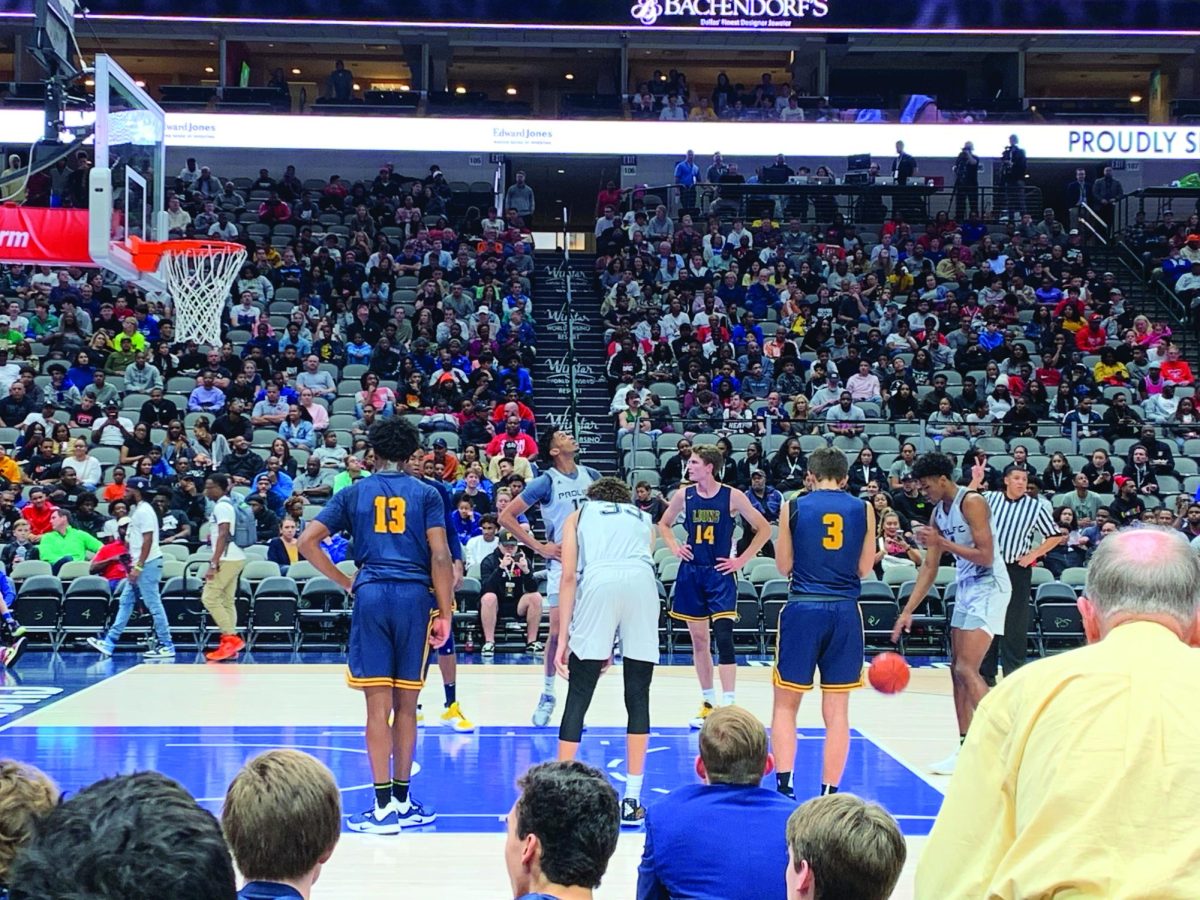
Photo Courtesy Andrew Laczkowski
The Lions play top national team Prolific Prep in the American Airlines Center during their 2019-2020 season.
Duke Basketball. University of Alabama Football.
Both of these programs have dominated in their sports, competed for national titles and gained the respect of their opponents year in and year out. Through their consistent accomplishments, the sports community has given each of these schools the coveted title of “powerhouse”.
The term “powerhouse” isn’t limited to college sports, however, as various powerful high schools have been coined football or basketball powerhouses across the country. Monteverde basketball, Prolific Prep basketball and Mater Dei football, among many others, have all reached this level of dominance.
This term is supposed to retain value and only be given to a select number of schools who have proven themselves as the greatest of their sport. However, it is often thrown around carelessly, regardless of whether the school dominates in a small conference or on a national stage.
For Assistant Athletic Director Josh Friesen, powerhouse schools deserve the title through how other schools perceive and react to them.
“When other kids are coming to your school and measuring themselves against you, then that starts to establish that you’re the top dog,” Freisen said. “When people are excited to beat you, that shows that you were a focus of theirs and that they took you seriously.”
As a Kansas alumnus, Friesen has experienced the environment of a well-known athletic program and has felt the pressure of playing on a team with high expectations. Despite the elevated standards, Friesen and his teammates remained gracious with each win, which Friesen has noticed is a common trait amongst powerhouse schools.
“One sign of a team that believes in itself is they don’t over celebrate wins. They know they’re going to win. They expect to win,” Friesen said. “They don’t rush the court, they don’t rush the field. They don’t overly celebrate because they expect to win the game.”
With consistent winning and an expectation to succeed comes a certain sportsmanship that creates mutual respect between both teams. For example, football powerhouses such as Alabama take pride in refusing to storm the field after a win, despite their enthusiastic fanbase, because they see it as disrespectful.
Similarly, St. Mark’s upholds the same values of sportsmanship, taking pride in winning with grace and losing with humility. As a freshman basketball coach, Friesen looks to promote the same values in his players.
“I hope that everybody shows respect, because if you’re being disrespected then disrespecting others doesn’t help you climb the ladder,” Friesen said. “I would hope that all schools, whether or not they are a powerhouse, would want to earn people’s respect by doing things the right way.”
While others schools’ perception of another program weighs heavily on coining a program as a powerhouse, for sophomore Asher Yoffe, a program’s culture and history of winning are the ultimate determining factors.
“It all starts with winning, and then the culture adds to it,” Yoffe said. “The worst team in the league with a good culture isn’t going to be a powerhouse, but a good team with a winning culture separates them from normal good teams.”
With the ever-changing dynamic of sports, there will always be underdog teams that make a surge to the top of the standings any given season. However, the term powerhouse can only be earned through sustained success over the course of many years.
“Consistency is extremely important because, for example, with the Spurs, they were an amazing team a few years ago, but people look over that now just because they’ve had a few rough years,” Yoffe said.
Although every program across the country has a culture associated with them, a coach can completely turn a program around by instilling a culture of winning in their players, promoting team success over individual accolades.
“A big piece is coaches who are not harsh, but demand a lot from their players, like UCONN and Dan Hurley, where all the players hold each other accountable,” Yoffe said.
For the most elite high school programs, competing at the national level against other highly touted teams across the country is what separates them from the rest of the pack.
“National recognition is pretty important,” Yoffe said. “For the teams that travel the country and play other national teams, then it’s extremely important.”
In the case of St. Mark’s, playing a national schedule against the top ranked teams isn’t feasible, however, some teams can be considered a powerhouse at the local and state level.
“There’s teams who play St. Mark’s, they know St. Mark’s and they plan against you,” Yoffe said. “If teams are talking about you on their schedule and they’re worried about you, I think it’s definitely something that can qualify you as a powerhouse.”